Milly Alcock is already slaying the critics
From her breakthrough role in House of the Dragon and double act with Tim Minchin in Upright, 22-year-old Milly Alcock is burning brighter than ever.
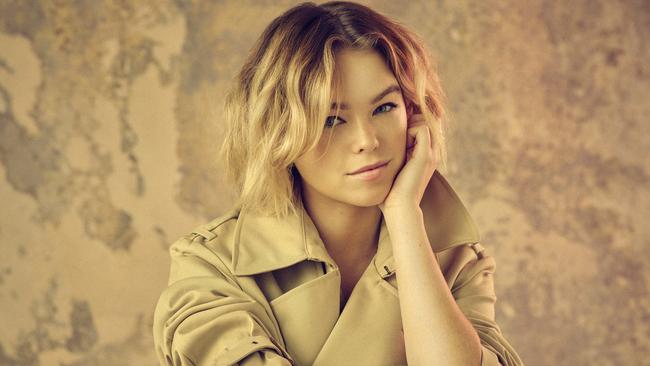
It’s 8am in London and I’m speaking by Zoom to Milly Alcock. Although it’s not Milly Alcock as we know her in the Foxtel TV comedy-drama Upright – raucous, in-your-face Aussie teenager Meg, who absolutely holds her own in a double act with co-star Tim Minchin. Nor is it Milly Alcock as the cut-glass fantasy princess Rhaenyra Targaryen in House of the Dragon, where she upstages distinguished British actors with a performance that has captivated film critics and fans of Game of Thrones alike.
Maybe it’s because it’s 8am on a Monday morning but she doesn’t want me to be able to see her, so I confront a blank screen and a girl’s soft voice. It’s been a hell of a journey for Alcock, who went from working at McDonald’s to appearing in Prada ads, at premieres and on magazine covers. She’s worked at breakneck speed over the past two years and she admits she’s “exhausted” from bouncing between Britain and Australia for filming. Maybe that’s why there’s no sign this morning of the storm and fury that has audiences worldwide hooked on her zest in Upright, and her subtle authority in Dragon. The 22-year old is instead tentative, recessed. It’s a serious, sincere, if still very young-sounding Milly Alcock I’m listening to, as she thinks deeply about acting and performance and the whiplash switch from Meg to Rhaenyra and back again.
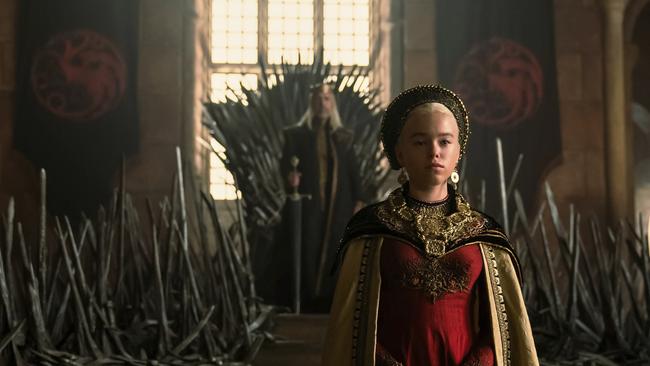
“I didn’t have any transition,” she explains. “I went straight from Dragon into Upright. So I was just absolutely exhausted. And that was the hardest thing for me, to find my footing, and kind of being burnt out while trying not to look burnt out. To give Meg the performance she deserves even though I was so f. king tired. That was really hard. The physical aspects [of Meg] like the nose ring and everything else made it easier [to switch to] because you could see how she was different.”
When the real Milly Alcock says “f. king” for quiet emphasis she doesn’t swear like an aria of self-definition as Meg does. And she chooses her words carefully. She reflects on her truncated schooling as work started to materialise in her early teens; the decision to drop out of Sydney’s Newtown High School of the Performing Arts, when she was cast in Upright, meant she missed out on the long farewell to childhood. “I skipped adolescence,” she says. “I knew this was what I wanted to be doing … I was in a school play as a kid and I just got this feeling. And I thought, whatever it is, I want that feeling. The feeling you get when you’re on stage or you’re on set and there’s something scary about it because it feels like you’re completely exposed. And I got hooked on that feeling. I told myself, ‘I have to make this work’.”
Alcock was brought up in Sydney by a single mother. She has two younger brothers, one studying environmental science, the other pursuing rugby union. “No one in my family works in the arts,” she says. Her mother went along with the decision to drop out of high school but insisted Milly had to arrange everything herself. “So I made all those first steps, got myself an agent and applied for parts.” One of them was in the TV miniseries Fighting Season, about soldiers in Afghanistan, in which Alcock played the daughter of Kate Mulvany and Ewen Leslie. And it was Mulvany who wrote with Leon Ford a lot of Upright’s first season (directed by Matthew Saville) and who recommended Alcock for the role of Meg.
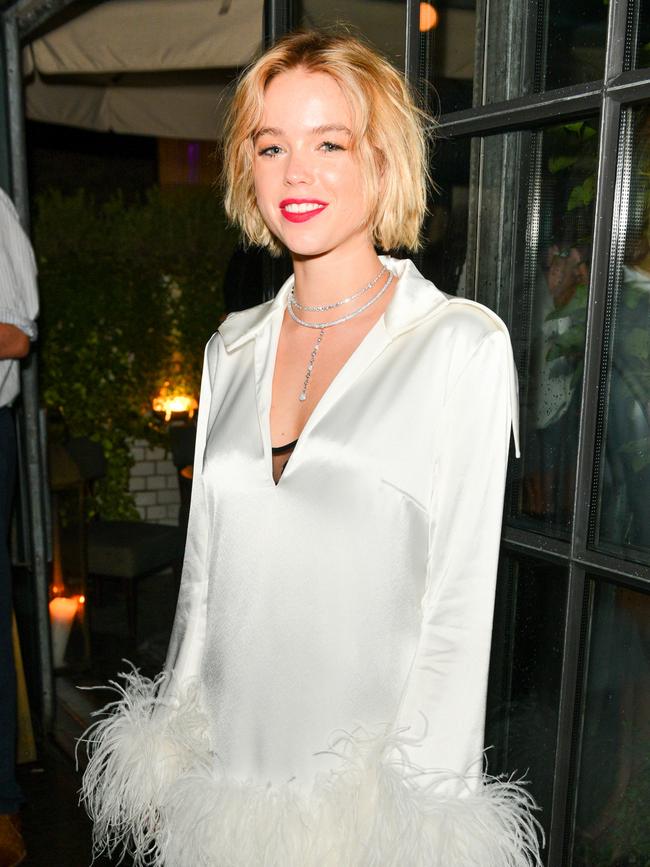
Tim Minchin, a man who’s not easy to impress, became sold on Alcock as soon as he saw her, although there were three other actors up for the role of Meg. “It was Kate who said, ‘Have a look at Milly’,” he recalls, adding: “She has the thing people call charisma and stillness. I saw the tape and I thought we didn’t have to look any further.”
For Dragon, the prequel/successor to the eight-season long TV behemoth Game of Thrones, Alcock sent a self-taped audition to HBO. She won the part and moved to London at the height of the pandemic. She lives with a friend in a small flat in the East End. And it’s here in London that she hopes to hone her craft. She admits with complete candour that she sees House of the Dragon as a stepping stone to British classical theatre. “I really want to do theatre and I really want to do independent films because I missed those steps. I want to go back and I want to get better as an actor.”
There’s something exhilarating about the clarity she has when she talks about her soaring ambition. She knows the discipline required to be the highest kind of dramatic artist; she’s thought about it a lot. “If you go into anything and you think you want to be better than anyone else, there’s an air of self-righteousness in that because you’re unable to disarm yourself and to be wrong, to take advice and to listen, to be collaborative.” Working with the Dragon ensemble taught her something about that, she says. “You have to be brave enough to fail publicly at work. And you have to allow yourself to not be the best person in the room.”
She’s happy to talk about the way she mastered her own quicksilver version of Standard English – what we once called the Queen’s English – even if she’s got some idiosyncratic theories about how this works. “I worked with dialect coaches pretty seriously,” she says, “one on set as well as just practising alone in my room. Ultimately the language reflects class. Upper class people don’t have to speak loudly, they don’t have to fight, but lower class people are a bit more boisterous because they’re fighting to be heard in a room.”
I find myself asking her a question I asked the lordly English actor Ian McKellen 20 years ago: Is she introverted, or is she the kind of actor who wants to take her trousers off and dance on the table? “I definitely think I’m more introspective,” Alcock says. “But I think most people are in the middle. Because I think most actors are sparkly and some of them shine too bright and some of them twitch.”
She has a fascinating intensity about her art. I ask her to tell me about the buzz that makes the terror worthwhile. “It’s like … when you’re at the edge of the water and you’re going to do a big jump and you’re scared of going down but as soon as you make impact it’s so fluid and free and euphoric … and you’re on a high with adrenaline.”
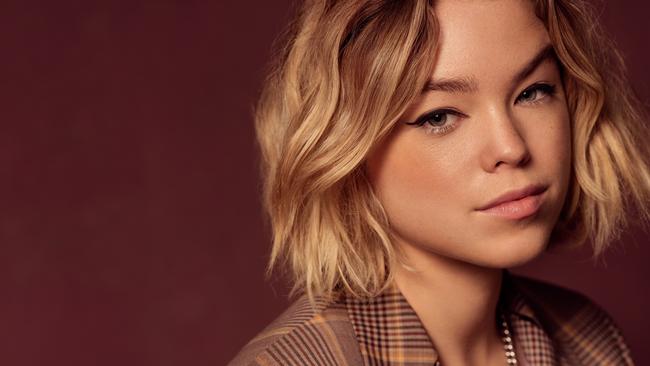
Her run in House of the Dragon has now come to an end. The older version of her character is now played by Emma D’Arcy, 30, but it’s Alcock who left the indelible impression playing the 15-year-old princess on the cusp of becoming a woman.
I tell Alcock the story of Laurence Olivier asking Richard Burton if he wanted to be a great actor or a household name – according to legend, Burton replied: “Both.” Then we cut to the chase: Does she want stardom or stature? “Stature,” she says without hesitation. The fact that she comes across as 4 foot 10 somehow makes this more poignant but you don’t doubt her for an instant. The absolutely weird combo of Meg in Upright and Princess Rhaenyra Targaryen in House of the Dragon convinces you that Alcock knows exactly what she’s doing as she plots her course on the way to achieving stature as an actress. It helps that she is self-evidently great in both performances. Whether it will take her to a career in theatre and independent film is another question. But simply put, Alcock is a star. And my hunch is she’s going to be a superstar.
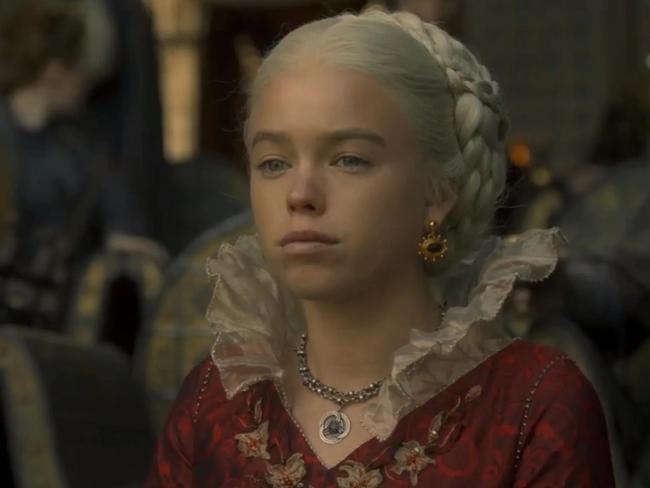
Still, maybe like Emilia Clarke, who played Daenerys Targaryen in Game of Thrones and has just done The Seagullin the West End’s Harold Pinter Theatre, Alcock will one day do Chekhov. Her talk about the value of ensemble acting and being collaborative puts her in rather a good position for London’s Almeida, or the National Theatre. She knows she wants to play Ibsen’s Hedda Gabler. When does she think she’ll be ready to play the role that was played by Ingrid Bergman, Glenda Jackson and Cate Blanchett? “Seven years, I haven’t suffered enough,” she says, as if bare truthfulness was the only way out of the ordeal of cross-examination. She adds she’d also like to play some roles that are “a bit softer”. Like the title role in All About Eve. Still, she says, she would always opt for happiness over success. She talks about how, in this business, people can latch onto you because “they want something from you”.
Some of the rave reviews for Alcock’s performance in Dragon – “defiant” and “magnetic” – were from those who observed the chemistry between her and Matt Smith, who played Dr Who and Prince Philip in the first two seasons of The Crown, and her rival for the dragon throne. She has spoken before about the use of an intimacy co-ordinator on set, and the “playful” nature of the collaboration with Smith. But what was the defining quality of House of the Dragon? “Funnily enough,” she says, “it was behaviour as opposed to actual acting. How to behave on set, how to treat people. How to be generous to the person you’re sharing a screen with. It was ultimately a masterclass in etiquette.”
I don’t ask if this is in comparison with the Upright production, which was apparently plagued by floods and other difficulties, and lost the scriptwriting services of Mulvany and Ford and Saville’s direction. Minchin did the lion’s share of the writing, and there was nothing remotely like the Dragon budget. Alcock went straight from the classical quietude and courtesy of the Dragon team into Season Two of Upright, where she’s four years older, nose-ringed, blonde (if not quite in the Targaryen way), and in trouble at 17.
Minchin, who at 47 is a generation older than Milly Alcock, has had the British theatre as his bailiwick for a long time now – ever since he took the Edinburgh festival by storm and then went on to write Matilda, the Roald Dahl musical, for the Royal Shakespeare Company, which became a runaway hit in the West End. His other big musical – Groundhog Day, which won the Olivier Award for Best New Musical in 2017 – was directed by Matthew Warchus, who has just made the Matilda the Musical film.
“She is self-evidently great in both performances. But simply put, Alcock is a star. And my hunch is she’s going to be a superstar.”
I make another Zoom call, this time to talk to Minchin about Upright and Alcock (it turns out my pronunciation has been wrong and the name has a flat “a” – “She’s only halfcocked”, Minchin quips). The conversation goes everywhere. He’s nothing if not visible with his signature long hair which he says is carefully nourished. He talks about how human beings are instinctive storytellers and this can reveal the better angels of our nature: “The way Aboriginal people talked about Uluru, what Jewish shepherds felt when they talked of Yahweh …” he says. He’s never less than bright, Tim Minchin.
Just at the moment he is exhilarated by the Matilda the Musical film – he’s just been to London for the premiere. The much dissected decision to get Emma Thompson to play Miss Trunchbull (when the role had traditionally been played by men on the stage) had nothing to do with gender, he says. And he adds that if you can get Emma Thompson to do anything, well, go for it. ‘Though, of course, you have to make Emma Thompson look six foot something,” he says. He adores Alicia Weir’s performance as Matilda on film. “It must be one of the greatest child performances ever.”
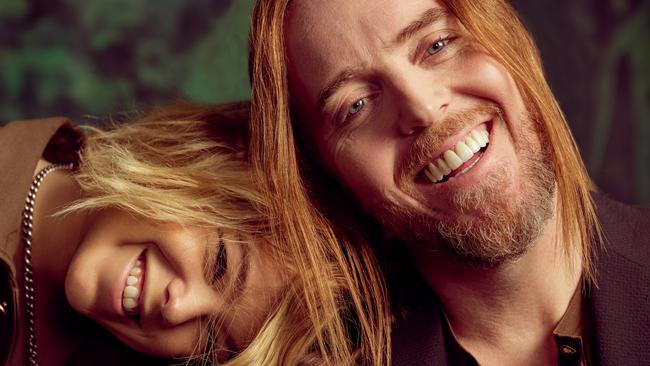
Talk of such wunderkinder, such resplendent young talent, naturally takes us back to Alcock. They’re so closely linked, is it possible for him to analyse her brilliance? “I am so close to her,” Minchin concedes. “But I think she just knows how to do it. She’s very self-sourcing. She’s not just good but she has enormous emotional range. She takes acting very seriously but not in a Stanislavskian, methody way.”
He notes that in House of the Dragon each actor is one piece in a puzzle, whereas Upright is extraordinarily dominated by Meg and her dad-like fall guy, Minchin. As they shot the series, he says, Alcock’s performance was so strong, it sometimes had huge ramifications. “Sometimes she’d do something, and we’d think, ‘Do we give her a note or just adjust the scene?’” He’ll attest to the toll Dragons took on her. “They [the makers of House of the Dragon] sent her to me so battered,” he says. “I thought, ‘I can write the kid a script and I’ll be the straight guy’ … [this] really is Meg’s story’.”
When plotting the first season of Upright, he says, you don’t get that Disney question from the start. “What does she want? It takes so long for you to realise that what Meg’s running away from is all to do with her brother. It’s a very slow resolve. It’s a comedy that falls towards drama.”
“Season Two has to pull some stunts,” Minchin adds. “It’s a tearjerker and runs the gamut through to being bombastic. It shouldn’t look as though I’ve used a stencil. But you don’t really know what’s going on until you reach episode 8 and discover the shit it’s dealing with.”
He admits to being difficult. “I’m a little bit exacting. It’s not that I have to do a Woody Allen and be an auteur, but by the same token, I do want to be an auteur and I am exacting. I go into hyperfocus,” he says.
Minchin concedes he’s not a leading man in the style of a Benedict Cumberbatch, let alone a Chris Hemsworth. “So if I want someone who’s on an existentialist journey,” he says, “I’ve got to f. kin’ write it myself.”
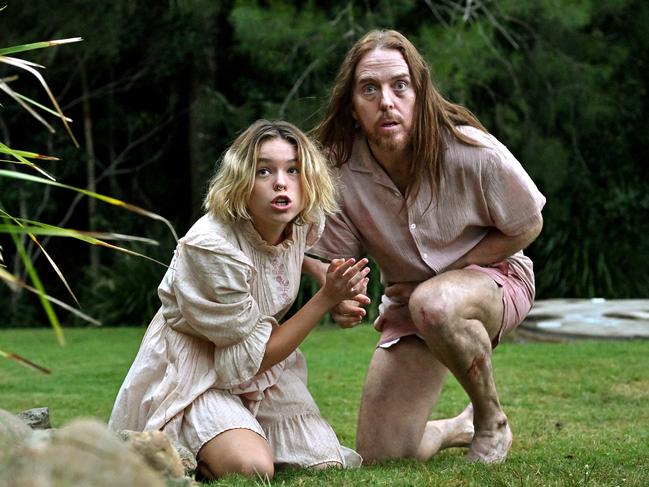
He refers to the limitations of his voice: “I have very little resonance,” he says. “I’m a storyteller songwriter”. He sounds pleased to be compared to such vocally limited singer-songwriters as Leonard Cohen and Randy Newman but points out that they had hits whereas he never has. He wryly says the best-known song he has written was Come Home Cardinal Pell, with its line “I think you’re scum!” When I mention that Pell was exonerated by the full bench of the High Court he points out that he never addressed the charges against Pell, only his responsibility for the state of the Catholic Church, which the Royal Commission criticised while he testified from abroad.
“I loathe public shaming,” Minchin says. “‘I lost my virginity to my wife. We’ve done well as a moral consequence. I have two kids, 15 and a half and 13. We have much in common with Catholics.”
In Upright, Minchin’s character Lucky Flynn is a musician and songwriter who, after hearing his estranged mother is dying, packs up his battered old upright piano for a 4000km road trip across Australia, and along the way becomes a substitute dad figure to Alcock’s Meg. You can hear during our conversation the intensity of Minchin’s paternal feeling for Milly Alcock, yes as an artist of stature – that’s what we all want, he says – and also as a young Aussie girl wrestling with the Angel of the mystery of Art.
House of the Dragon is on Binge and Foxtel together with the first season of Upright. The second season starts November 15 at 8.30pm.






To join the conversation, please log in. Don't have an account? Register
Join the conversation, you are commenting as Logout